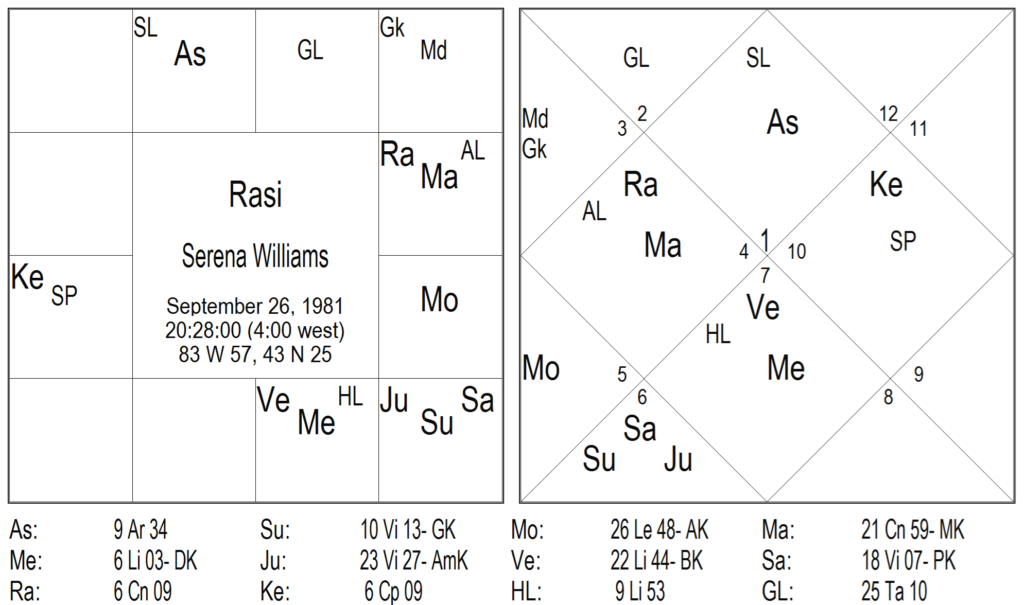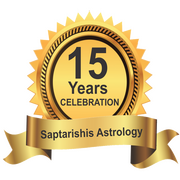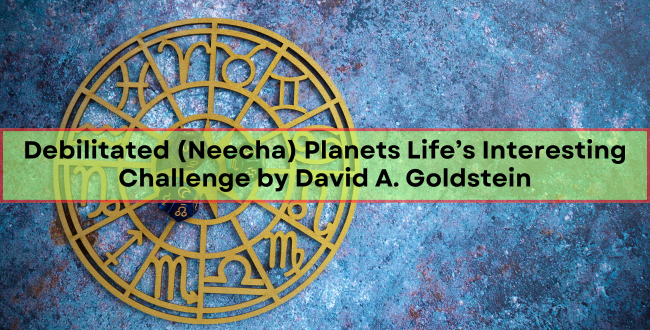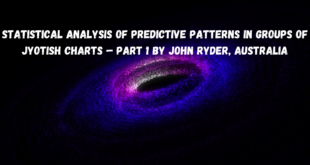Article by David A. Goldstein
Introduction: Neecha (Debilitated) Planet Analytical Approach
At the time of this writing, Serena Williams, the number one-ranked women’s tennis champion just won the French Open final in a tantalizing competition with Maria Sharapova, currently the number two-ranked women’s tennis player. The power of Serena’s serve is exceptional and her intense competitive spirit overflows. Serena’s chart (born 9-26-1981, Saginaw, MI, 20:28) and life story are a fascinating demonstration of the deeper expression of debilitated Mars, as revealed in her horoscope.
In 2003, I published a paper in the ACVA Journal Vol. 8.2 on the topic of debilitated planets and discussed several famous athletes’ charts, all with debilitated Mars prominent. The major themes and observations of debilitated planet expression, delineated in that paper, have
continued to hold true over the years and are worthy of further discussion.
In any chart analysis, the most important element is to find “confluence” across astrological factors to support statements and predictions within the chart. The finding of one debilitated planet in the chart does not necessarily mean that all areas of life governed by that planet (karakas) are ruined or necessarily harmed.
Case in point; examine debilitated Jupiter in Capricorn. Jupiter governs the following: one’s spiritual orientation, attitude toward religion, the law, ethics, morals, as well as prosperity, wealth, attitude about money/spending, education, philosophy of life, the liver, gall bladder, pancreas, fat and sugar metabolism (or lack thereof), cholesterol, propensity to allergies, the hips and lower back region, philanthropy, charity and children.
Jupiter in Capricorn will behave opposite of its natural inclination, since it is in Saturn’s sign. Jupiter is a naturally expansive, optimistic, growthful, generous planet. However, in Capricorn, Jupiter takes on the qualities of Saturn, expressing more constricted, critical, pragmatic, frugal, apprehensive qualities in the areas Jupiter rules. There is a discomfort with excessiveness and expansion beyond what is perceived as necessary, practical and reasonable.
For confluence, first examine the strength of the house(s) associated with a particular area, as well as the karaka and ruling planet(s) of that house(s). For example, when examining the area of children in a chart: assessment of the 5th house and its lord (ruling planet), the status of Jupiter (karaka), as well as the condition of the Moon and 5th house from the Moon will help to determine the overall status for this area of life. Hence, simply having neecha Jupiter does not necessarily indicate that the individual will have no children, particularly if other relevant chart factors, such as a strong 5th house, are otherwise favorable for having children.
Example # 1: For an individual with debilitated Jupiter; if Jupiter is fallen, but the main financial houses (2, 5 & 11) are strong, the 9th house is weak and there are a few Dhana (wealth) yogas present, we might anticipate strength for finance and wealth. Yet, he is frugal, might have children, has a more practical approach to religion and spirituality, but also has difficulty with long-distance travel, as well as some problems with the lower back and hip areas.
Example # 2: In comparison, take the same debilitated Jupiter in another chart; with strong 9th house, but weak financial houses, afflicted 5th house and no wealth yogas present in the chart. That individual will probably have no children, or have problems involving children. He is likely to have a strong proclivity for long-distance travel, advancing in higher education, spiritual and religious involvement, but less ability to sustain or amass wealth. He might have problems with the liver and/or pancreas, may be diabetic, and have problems with cholesterol and fat metabolism, but no problem with the hips.
To review, a “debilitated” planet is in its fallen constellation. Planets positioned precisely at the deepest degree of fall or closely approaching this degree are in extreme debilitation and confer significant difficulties associated with that planet, manifesting in the individual’s life. A debilitated planet found at any degree of the fallen constellation is still considered to be afflicted or weak, but to a lesser extent. The planets in their deepest debilitated state are as follows: Sun in Libra (10o); Moon in Scorpio (3o); Mars in Cancer (28o); Mercury in Pisces (15o); Jupiter in Capricorn (5o); Venus in Virgo (27o); Saturn in Aries (20o), and Rahu in Scorpio and Ketu in Taurus.
When a planet is found to be in debilitation, it is important to examine the entire chart to determine what specific areas are going to be impacted, and whether other factors in the chart will assist that person in overcoming any difficulties or setbacks indicated by the weak planet. This is a critical assessment, involving thorough examination of the condition of the Lagna, Lagnesh, Moon and Sun, and any other strong planets, especially Mahapurusha yogas.
Based on my personal observation, if the overall horoscope is strong, with strength conferred to the Lagna, Lagnesh, Moon, and Sun, as well as having several planets located in the kendra and trikona houses, then the debilitated planet will take on special meaning for that individual. The debilitated planet becomes an “Achilles heel” and the individual will unconsciously work at strengthening those areas because they are a source of insecurity and weakness. For this reason, we observe some of the greatest athletes with debilitated Mars, the planet governing sports, competition, assertiveness, ambition and physical power. It is as if the individual comes into this lifetime to hone the areas that were somehow problematic in previous lifetimes. They want to get it right this time around!
Conversely, if the overall horoscope is weak, then the debilitated planet will reflect the problematic areas and the individual may shy away from most of the significations associated with that planet. He or she will run the other way. It’s fascinating to observe this phenomenon in charts and it is quite common. Sometimes, several of the significations are not harmed, but the health problems that arise are directly related specifically to that debilitated planet.
Then there is the “neecha bhanga” or “neecha bhanga raja yoga” controversy. Basically, this dictum states that a debilitated planet is released from debilitation, or it is cancelled if certain other planetary configurations co-occur. For example, if the debilitated planet’s dispositor is exalted and in a kendra, then the debilitated planet is considered released. In reality, the debilitated planet still expresses itself as problematic in some form. However, the problems that occur are more likely to be resolved or overcome during the lifetime, or the setbacks related to that planet may actually create a new opportunity that would never have happened if the problem did not occur in the first place!
Nonetheless, a debilitated planet will still express itself from that vantage point. For the Sun, Libra is a constellation devoted to relationships and fitting into the larger society and culture. The Sun, however, is self-focused and wants to be recognized for his greatness, independent of others. Hence, the Sun in Libra is not able to express himself for his own sake. He feels compelled to take the opinions of others into account, which results in some level of insecurity and self-consciousness. He does not want to be judged or criticized for not fitting in harmoniously with the social culture. For Mars, Cancer is a constellation devoted to receptivity, emotional comfort, family, security, motherhood and home life. Mars is a planet of force, direct action, fearlessness, independence, speed and movement, all antithetical to the sign of Cancer. In this placement, Mars does not function according to its normal, inherent nature, and for this reason, Mars is considered debilitated.
Serena Williams: Tennis Success Story
DOB: 9-26-1981, 20:28, Saginaw, Michigan, USA

Debilitated Mars in Action
At 31 years of age, Serena Williams is currently the number one ranked women’s tennis champion in the world. It is rare for someone to be number one in the world of tennis past 30 years of age. She just won her 16th Grand Slam, after winning the final at the French Open against Maria Sharapova on June 8, 2013.
Serena is the youngest of five sisters and her next oldest sibling, is the famous Venus Williams, also known for her highly successful tennis career. At the age of 14 Serena turned professional and proceeded to win the next 46 of the 49 tournaments played. In 1999, Serena was ranked 21 in the world after winning her first Grand Slam title. She won every game played against the top 5 ranked women tennis players that year.
Then in 2002, her rank moved up to number 2 in the world. Serena won her second Grand Slam winning the US Open, Wimbledon, French and Italian Open tournaments. To date, she has achieved 4 Olympic Gold Medals in tennis, won 16 Grand Slams, including 31 total winning titles. Her elevated level of success in professional tennis is a proven fact.
Serena’s chart reveals Aries (Aswini) Lagna, with the Lagnesh Mars in debilitated Cancer at 21:58 degrees (Ashlesha), conjunct Rahu in the 4th house. She has Moon in the 5th house, Leo (Uttara Phalguni). Sun, Saturn and Jupiter are all in the 6th house of competition and Venus is in Malavya yoga in the 7th house with Mercury.
From this cursory overview, notice that the Aries Lagna (competition, independence, & pioneering qualities) is ruled by Mars in Ashlesha in a kendra (house). Since Mars is on an angle, that creates neecha bhanga raja yoga. The nakshatra of a debilitated planet will also provide clues about the types of issues that individual may confront. Mars in Ashlesha is highly competitive and is symbolized by the Nagas, the serpents. They are known for their hypnotic, mesmerizing shakti and ability to paralyze the opponent. That is precisely what Serena does when she plays tennis.
Her Moon is strong in the auspicious 5th house (of sports and entertainment), but it is in a Papa Kartari yoga, surrounded by Mars in the 4th and Sun/Saturn in the 6th house. Her Moon also forms Shakata yoga, creating a life of turbulence, ups and downs and change. This points to her discontentedness and lack of peace in her life. Yet, this emotional discontent is also the primary motivating factor promoting competitiveness and urgency to win. The underlying psychological motivation is to gain a temporary sense of comfort from winning the game, thus “feeding” or elevating her Mars (strengthening it). Her Mars/Rahu has no boundaries and does not know when to give up.
Forming Malavya yoga, Venus in Libra is strong in this chart. Moon in the 5th house (Leo), combined with the Malavya yoga creates a strong artistic orientation and interest in acting, drama and fashion. Serena has her own clothing line and she has had lucrative business contracts over the years, representing Nike company. Serena has also appeared on some television drama shows as an actress on the Law & Order SVU series, and she has worked on some films of her own. Her Moon in the 5th house and Malavya yoga reflect these successful ventures and artistic interests.
Focusing on Serena’s neecha Mars in Ashlesha, notice it is conjunct Rahu, which magnifies the Mars tendency enormously. Since Mars is the Lagnesh, and it is with Rahu, she is ambitious, compulsive, driven and obsessed with competition and winning. Her Moon indicates that she is rarely satisfied, so she continues to work hard at beating and psychologically paralyzing her opponents, as the Ashlesha Mars can do, effortlessly.
She is also quite emotional, openly expressing anger, outrage and frustration. Over the years she has learned to suppress some of this emotion publicly because it harmed her public persona and affected her career success. Consider Mars/Rahu in Cancer, an emotional water sign. She is also very involved and close to family members, another Cancerian quality.
This is an interesting case demonstrating how a debilitated planet, whose main significations; competition, ambition, athleticism, speed, physical strength, stamina, motivation, independence, aggression, domination, precision and power have become the primary motivating forces in Serena’s psyche. She has taken this to the extreme, wanting above all else to “win” and 16 Grand Slam titles is never enough, because that Mars/Rahu combination is hard to ultimately satisfy. There is likely no magic number that will satisfy her thirst to win.
It is the debilitated Mars that overwhelms and motivates her to resolve its inherently weak position. Subconsciously, there is an awareness of this imbalance, that Mars has to be strengthened, balanced and developed. Since Mars is the Lagnesh, it represents her personality and life orientation. This is an excellent example of how expression of a debilitated planet is exaggerated because the individual is taking its imbalance to the other extreme. She now demonstrates the best of Mars, being the top tennis player in the world, competing against the best and winning. But, winning will not change the Mars that she was born with. She continues to live with that subconscious insecurity, “I must win every game, or I am uncomfortable with myself and less than adequate.”
The debilitated planet plays this role wherever it is found. These planets offer the individual an arena in which to work on self-development and ultimately to release the insecurity and become freer and more balanced in that area. For this reason, many individuals with debilitated planets work harder in life for success and achievement because the underlying motivation is to fill that space which is out of balance or weak. The Vedic astrologer may point out this interesting phenomenon involving debilitated planets that often monopolizes the individual’s life focus. This is a more constructive explanation of this neecha planet situation and offers the client a helpful option to resolve some deep-seated issues and dilemmas.
About Author: David A. Goldstein, Ph.D. is a full-time professional Vedic Astrologer who received his doctoral degree in Clinical Health Psychology (1991) from the University of Miami in Coral Gables, Florida (USA). He has published several research studies, book chapters and journal articles over the past 30 years in the fields of Vedic astrology, health psychology, cancer biology and psycho-neuroimmunology. He received formal training and Level II certification in Vedic Astrology through the American Council of Vedic Astrology (ACVA) beginning in 1995. He is currently the director of the Vedic Astrology Institute of Central Texas, in Austin, where he maintains a bustling private practice, offering consultations, tutorials and lectures. On-going research in the areas of medical diagnostics (oncology) and psychological dimensions as revealed through Vedic astrological charts are of particular interest. In 2013, Dr. Goldstein received the prestigious award from the B.V. Raman & Rajeswari Research Foundation, with the title, “Jyotish Choodamani (Crown Jewel of Jyotisha) for his contributions to the field of Vedic Astrology.
 Saptarishis Astrology Magazine Into Creating Astrologers
Saptarishis Astrology Magazine Into Creating Astrologers






